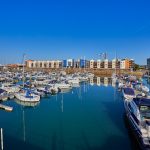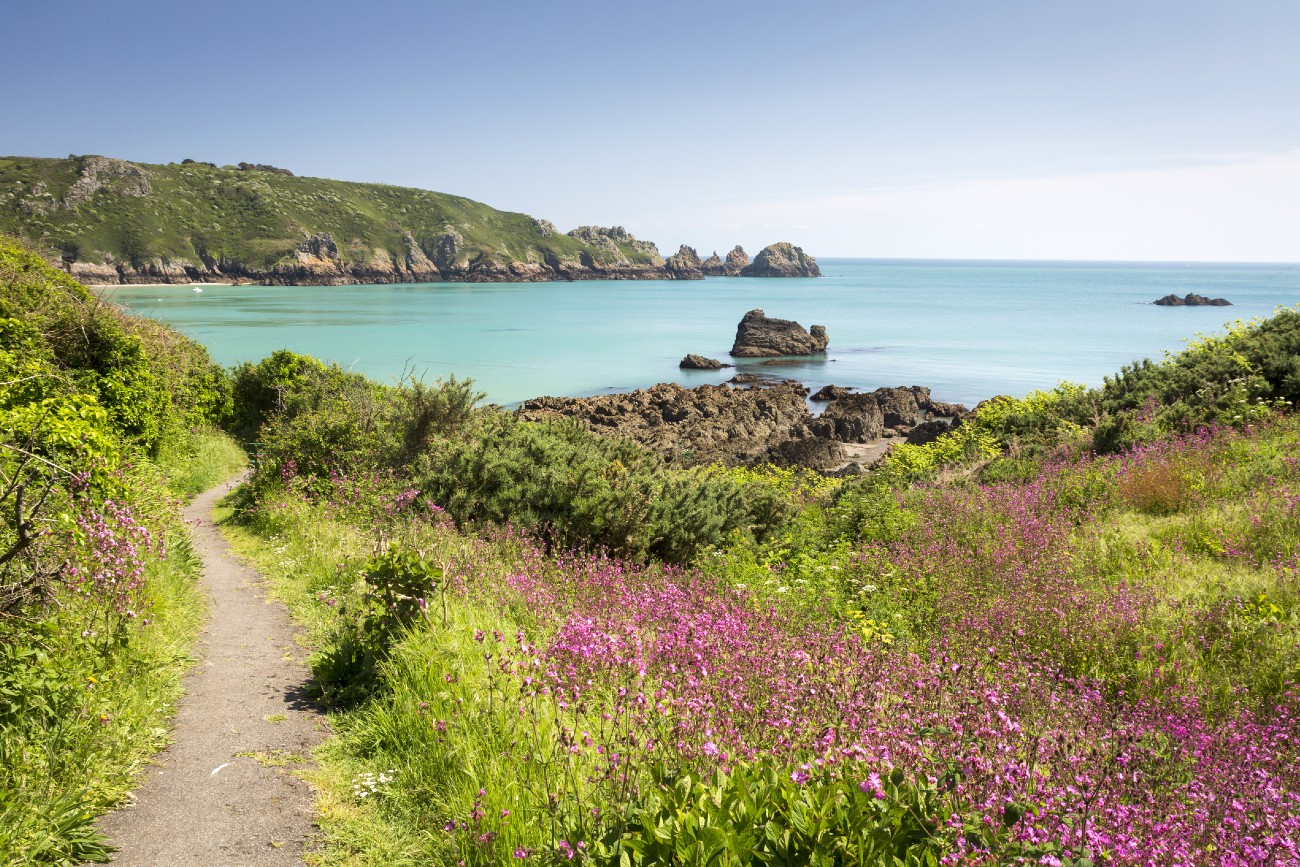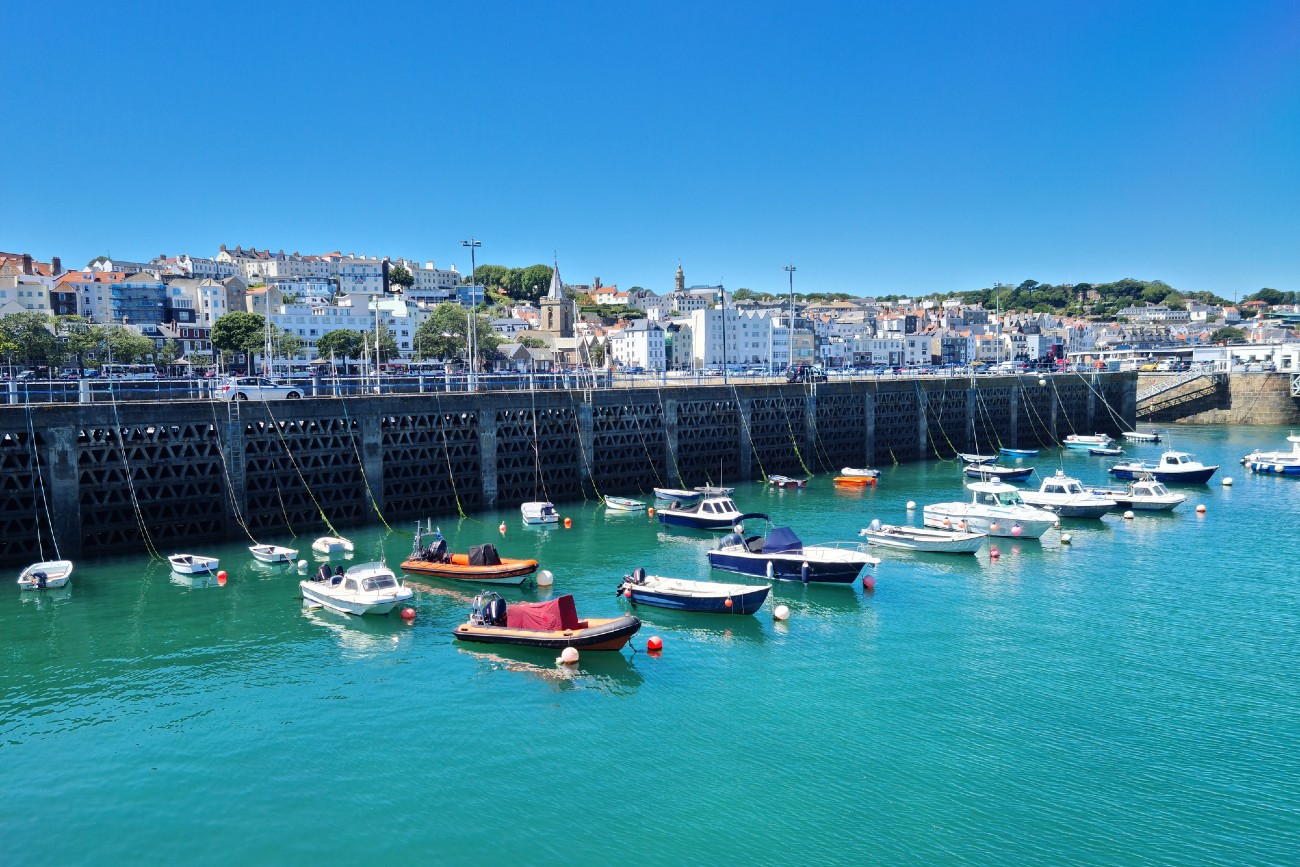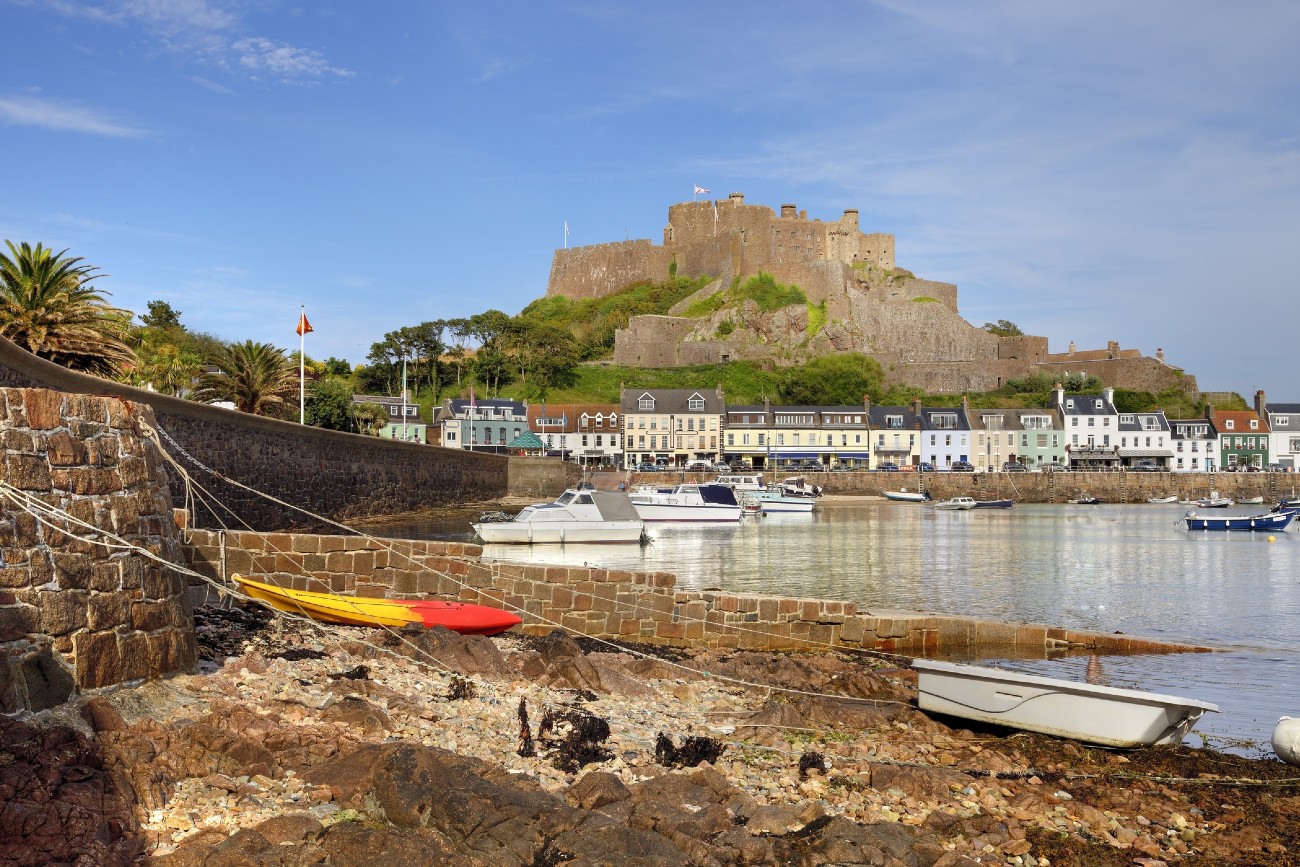
Jersey is another of The Channel Islands that is dependent on the British Crown, although it is an autonomous territory of the United Kingdom. It is located about 100 miles off the coast of Great Britain and only 14 miles off the coast of France. It is the largest of the group, with an area of 116 square kilometers.
Every corner of Jersey is steeped in history, be it some vestiges of Neolithic architecture, to castles, bunkers and structures that served as a defense mechanism on the island’s coasts during different war episodes that took place on the island. This is how we find monuments to Jersey militiamen and British soldiers who fought French forces during the Battle of Jersey in 1781, and places that recall the invasion of Nazi Germany from 1940 to 1945.
As for nature, the Jersey coast is striking, as it has one of the most extreme tides in the entire planet, to the point that it retreats twice into the sea, exposing a landscape of rocks and sands that stretches across the horizon.
Although the island is independent from the United Kingdom, local authorities promote Jersey as an extension of the City of London. Its head of state is Queen Elizabeth II (who serves as Duchess of Normandy) and matters related to foreign policy and the defense of the island are handled directly from the UK. Everything concerning financial matters needs the approval of the Privy Council of London.
Jersey has a parliament called the States of Jersey. It has 49 representatives, 8 senators and 29 deputies who are elected by the citizens of the island. They are in charge of electing the Prime Minister and the Council of Ministers who lead the government.
Jersey’s Financial System
While the island’s politicians fulfill the functions for which they were elected, they serve almost with one goal in mind: to do whatever it takes for the benefit of Jersey’s financial system.
This is how these representatives, as well as lawyers and financial experts do everything in their power (within the legal framework) to make the island’s banking sector an ideal place for people who have a respectable economic capital and who wish to open an account.
There is a close connection between Jersey’s financial system and that of the United Kingdom, more specifically that of London. And is that the bulk of the deposits made on the island are kept in British banks, which helps to keep it solid and stable. Furthermore, as GlobalBanks.com explains, “Jersey bank accounts act as a tax-efficient conduit for foreign investment into the UK.”
Jersey’s popularity in banking is such that most UK banks have a presence on the island, as well as nearly half of the top 25 in the world. They are in charge of offering their clients not only the opportunity to open bank accounts, but also to structure trusts, manage wealth and investments.
Bank accounts that can be opened in Jersey are primarily aimed at international clients and non-residents of the island. Especially to those people and companies that constantly need to carry out cross-border transactions. For this, the financial system has 13,000 people who work in it, who speak English and are highly trained in everything related to banking and its instruments.
Now, opening a bank account in Jersey is not for everyone. For example, it is not suitable either for the individual non-resident with less than £ 25,000 or for a small company looking for day-to-day banking.
On the other hand, it is ideal for UK citizens and residents who have plans to move abroad, for non-residents who meet the requirements of banking, investment funds, and foreign entities managed by Jersey Trust and Company Service Providers (TCSPs), among others.
For those seeking the services of retail banking, there are some institutions that provide this service. However, it is important to know in advance what the conditions are, since some establish restrictions regarding the amount of money deposited, as well as the nationality of the client, in the case of a non-resident.
One of the questions that many people are asking themselves right now, speaking of the financial system, is how will Brexit affect bank accounts in Jersey? According to most experts, the impact will be minimal, since the money received by banks on the island does not go through the local economy, but is deposited in banking institutions in Frankfurt, Zurich, Paris, London and other major cities.
Taxes in Jersey
Although it is important to consult an expert in tax matters before opening a bank account on the island, and that citizenship, country of residence and the amount available to open an account also come into play, who can do so will benefit from the tax haven conditions of this place. In Jersey there’s also no capital gains tax, transfer tax, VAT, withholding tax, or wealth tax.
Tourism has benefited from the absence of VAT, making luxury goods cheaper in Jersey than in the UK or France.
Since 2008 there is a goods and services tax (GST) at a fixed rate of 3%.
The Island’s Economy
We already mentioned the financial services it offers, which represent 60% of its economy and which make it a favourite destination for entrepreneurs and investors who want to take advantage of its benefits. However, there are a number of other activities that boost Jersey’s economy.
Although the British Pound circulates normally, they also issue their own currency: the Jersey Pound, which only circulates on the island, although it is accepted in the UK and can be exchanged at the Bank of England.
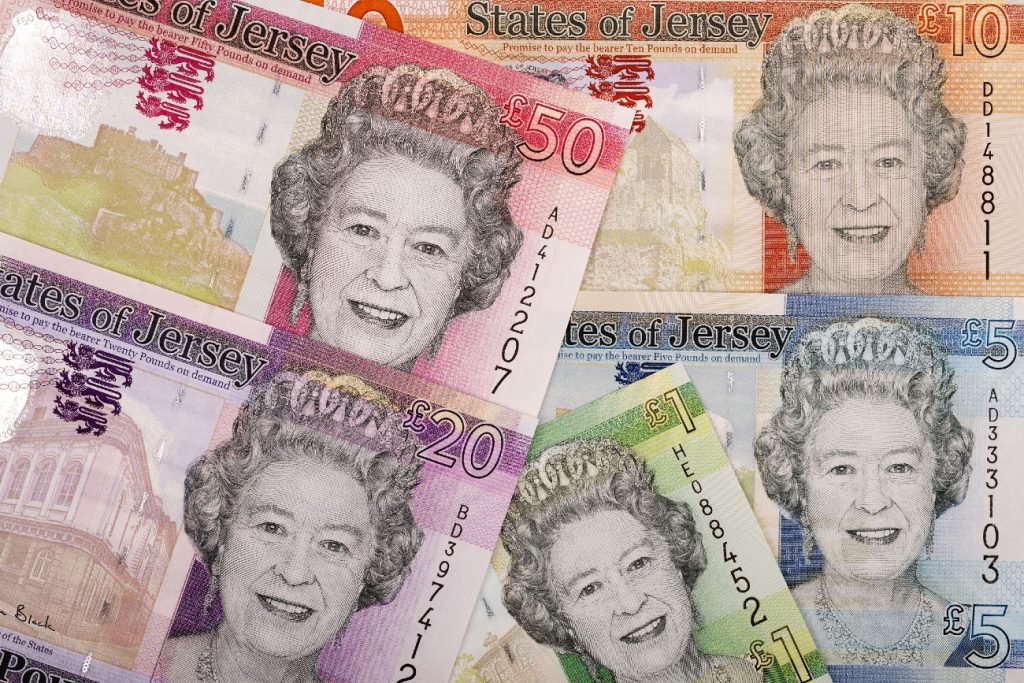
Jersey Pound
Since 1969, Jersey has also issued its own postage stamps, as the British are not allowed. Due to their low emissions, they are highly sought after by collectors, which represents an important source of income.
Thanks to its beautiful natural landscapes, its financial system and that there is no VAT, Jersey is a favourite tourist destination. Between 2016 and 2017 they received a total of 726,800 visitors who left £250 million on the island.
Agriculture is another source of income for Jersey. Although many types of vegetables are grown on the island, potatoes and dairy are its main products. In addition, the meat of the cows raised on the island has also been recognized for its high quality.
In 2005 Jersey was awarded the title of ‘Fair City’ (or rather we should say “Fair Island”) thanks to the honesty of its citizens. An example of this is that when farmers have surplus food, they place it in a basket on the side of the road so that those who pass by can take what they need and leave the corresponding amount in the cash box.
A Paradise for e-Commerce
We already explained that the island’s political system is focused on making the financial system work properly, thanks to its approach to a free market economy and support for entrepreneurship. This vision has also made Jersey the ideal place for those wishing to establish an e-commerce business for the past few years.
The island has a solid postal service, reliable web hosting services, IT systems, media marketing and professional e-commerce administration, among others, which make it an ideal place to carry out this type of business.
Jersey also has regulations that guarantee the legitimacy of operations, as well as the quality of new businesses and the island’s reputation as a hub for electronic commerce.
The VAT exemption, the proximity to Europe and the UK and much more favourable regulations than those offered by the continent and the United Kingdom, are other advantages of establishing an e-commerce company on the island.
There are also opportunities to benefit from reduced direct tax rates.
Online gambling is another of the digital industries that has seen Jersey with interest and vice versa. Legislation was passed in 2011 that allowed for a full licensing framework for the island.
Intellectual property is also protected in Jersey, thanks to its laws related to this matter. The legal office of the States of Jersey monitors compliance with the intellectual property and trade treaties on the island so that intellectual property registries are recognized worldwide.
Sightseeing in Jersey
Saint Helier is the capital of Jersey and, as we said at the beginning of this article, it is a city that, like the rest of the island, is full of history, but also beautiful landscapes, a port with boats of different sizes for those who want to enjoy the benefits of this place.
For those who want to delve into the fascinating history of this place, Saint Helier offers the Jersey Museum & Art Gallery, as well as the Maritime Museum, which tells the anecdotes, legends and life of the sailors who gave life to this island. Right next door you will find the Occupation Tapestry Gallery, a display of textiles made by locals to celebrate the liberation of Jersey after the Nazi occupation.
For those who go shopping and want luxury items, King Street is the right place. If you prefer more traditional shopping like I do and want to try the flavours of the place, Central Market is the best alternative.
At low tide, you can walk along Saint Aubin Bay to Elizabeth Castle, a fortification dating back to the 16th century. If the tide rises while there are people in the castle, their return is made on a ferry that is arranged for this purpose.
La Hougue Bie, a 6,000-year-old building located in Grouville, dating from Neolithic times, and which was a German bunker during World War II, today houses a museum where locals remember those who were drafted to carry out forced labour to build the Nazis’ defence infrastructures.
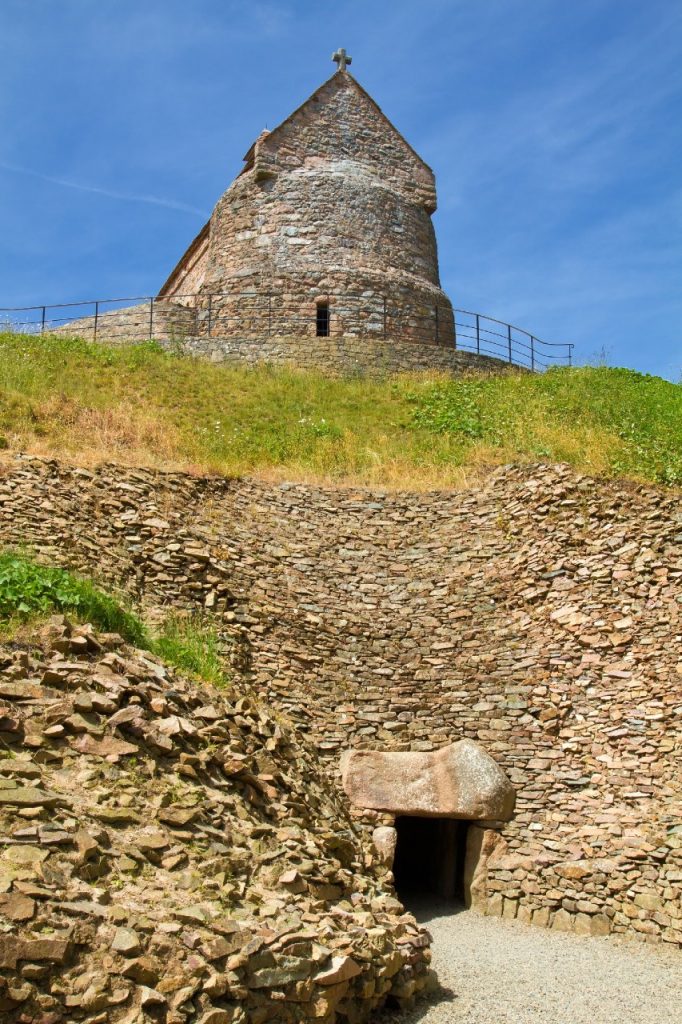
La Hougue Bie, Jersey
The Geology and Archaeology Museum shows us the history of the island during those Neolithic times, as well as the time of the Celts and the Roman Empire, with samples of instruments, as well as coins and pieces of gold of great value.
Jersey’s shores are one of its greatest natural attractions and visitors have plenty of miles of them to simply stop, contemplate the scenery and breathe in the sea breeze, or go further and take a refreshing dip in its waters.
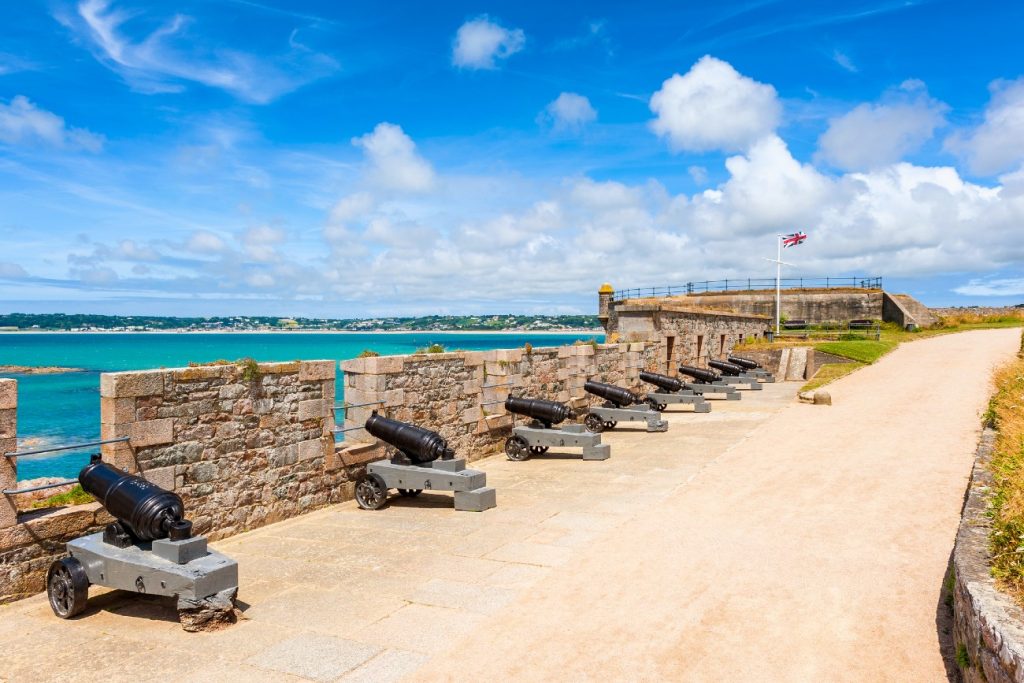
Cannons at Elizabeth Castle Jersey
Les Dirouilles
The Channel Islands not only has islands of great importance, but also smaller spaces such as Les Dirouilles, a group of rocks that is located to the northeast of the Bailiwick of Jersey, are part of its territory.
They are popularly known as “Les Pièrres” (the rocks).
Les Ecréhous
It is another group of uninhabited islets and rocks located six miles northeast of Jersey.
It has three large islets that are the most important: Maîtr’Île, La Marmotchiéthe and Lé Bliantch’Île. While the islets of Les D’mies, La Grand’ Naithe, L’Etchièrviéthe, Lé Fou and La Froutchie are smaller and of less importance.
Les Minquiers
Les Minquiers is another group of uninhabited islands and rocks, but to which fishermen, canoeists and sailors flock who want to explore or fish in its waters.
It is located 9 miles south of Jersey and historically famous because at the end of World War II, a small company of German soldiers who were there were the last to surrender to a fishing boat. It is also famous because Felix Gaillard, a former French Prime Minister, was found dead days after he disappeared from his yacht in July 1970.
Les Pierres de Lecq
Les Pierres de Lecq, also known as Paternosters, are a group of uninhabited rocks located 3.7 miles between Jersey and Sark, being L’Êtaîthe (the one in the east), La Grôsse (the big one) and La Vouêtaîthe (the one in the west), the three most important rocks of the group.
The name Paternosters (or Our Father) is due to a legend that says that a ship where women and children were traveling was wrecked in Les Pierres de Lecq, so they say that the cry of the little ones is heard with the sound of the wind. That is why superstitious sailors pray an Our Father as they pass by.
In the area it is common to find dolphins and other small cetaceans.
Find out more about the local food in the following article: Discover the Mouthwatering Delights of Jersey, Channel Islands

